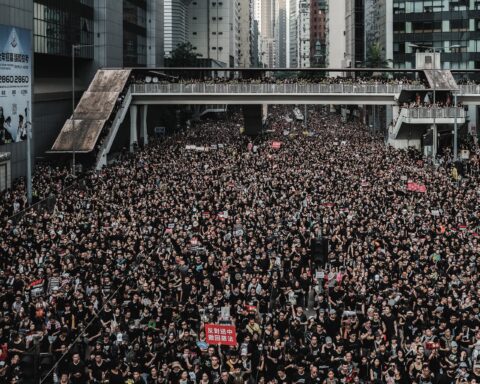Every city has its own urban legend. Vancouver’s fantasy over the last few years is that it has the world’s second most unaffordable housing.
On the back of this piece of unchallenged, unverified claim, Canadian opinion makers and media have been portraying a city pushed to a breaking point by a runaway housing crisis caused mostly by wealthy immigrants and corrupt Chinese officials fleeing to Vancouver with stolen money.
A more twisted version paints Canadians of Chinese descent as Beijing’s pawns in a long-term chess game to take over Vancouver and its housing market.
Either way, the city’s rising housing cost has become an issue in this year’s federal election with Chinese buyers firmly cast as the villain in profiteering at the expense of the city and its regular working people.
The political pressure has led Prime Minister Stephen Harper to announce his government is investing $500,000 to gather “comprehensive data” and study the impact of foreign investment in Canada’s real estate market.
This special five-part series deconstructs the narrative to present the issue in a broader framework.
Perhaps the biggest flaw in Vancouver’s blame-the-Chinese narrative is that commentators often start off with a reference to Demographia and its limited survey on housing affordability in nine countries.
The Illinois, U.S.-based consultancy is owned and operated by conservative public policy consultant Wendell Cox who opposes urban densification and public transit in favour of sprawl and the use of private cars.
This begs an important question: If Vancouver was found to be more like 20th or 50th, rather than second, in a truly global list on unaffordable housing, would the city be deemed to be facing a “housing crisis”?
Might a much lower unaffordability ranking take away the hysteria and alarmism sufficiently to focus the debate on increasing the supply of affordable housing?
Informed of his mistake, Vancouver Sun columnist Douglas Todd, another leading voice in the blame-the-Chinese-camp has since amended his description of Vancouver to being “the second most unaffordable city in the English-speaking world” after Hong Kong.
London and Singapore, two global cities, are likely to have more unaffordable housing than Vancouver.
This too is mistaken, though, as London and Singapore, two global cities, are likely to have more unaffordable housing than Vancouver.
Examining the data
The basic error in the crisis narrative stems from not examining and verifying the raw data on housing prices and median income that Demographia uses in computing its affordability ranking.
In his May 22 comment, South China Morning Post’s Ian Young wrote that Vancouver has left Singapore “in the dust in terms of unaffordability” based on Demographia showing the Canadian city’s housing price/income ratio rising to more than double that of the Southeast Asian city state’s.
“I seriously doubt that Hamilton is on par with Singapore. Housing in Hamilton is relatively cheap.”
According to Demographia, Singapore, a global financial, trading, oil refining and shipping hub rated by the authoritative Economist Intelligence Unit (EIU) as the world’s most expensive city (cited by the BBC), ranks a mere 89th, incredibly making its housing as affordable as laid-back Hamilton in Ontario.
“I seriously doubt that Hamilton is on par with Singapore. Housing in Hamilton is relatively cheap,” says Netina Tan, a political science associate professor at the Hamilton-based McMaster University, who has lived and worked in Singapore and Vancouver.
Demographia lists Hamilton’s median housing cost as C$344,200 and the median annual household income as C$69,200, giving the city an affordability ratio of five. This puts it on par with Singapore, which according to Demographia, has a median housing price of just S$405,000 and household income of S$80,500. [Current exchange rate C$1=S$1.08]
While the income figure looks correct, the median housing cost is too low as the survey covers only government-subsidized public apartments built and sold by the Housing Development Board (HDB), explains Samantha Law, marketing director for Miracles Realty Group.
On Singapore’s 718-sq km plot, 5.5 million people live alongside one of the world’s most active financial centres, three world-class oil refineries, two major petrochemical complexes as well as several power plants, industrial parks, reservoirs and shipyards, and one of the world’s busiest seaports, making the tiny country’s land cost one of the highest in Asia.
Large tracts are also taken up by the country’s powerful military and extensive highway system.
In contrast, Hamilton’s 520,000 residents live in a sprawling 1,140-sq km city, with many single-family houses near the downtown core priced at between C$200,000 and C$300,000. An MLS listing for a “beautiful two-storey three-bed home (on a 2,460-sq ft lot), located in Great Central Hamilton, close to schools, shopping, hospital and highway access,” is available for C$269,900.
In Singapore, that would be the price of an aging one-bedroom public housing apartment of about 700-sq ft in an outlying suburb, said Samantha Law, marketing director for Miracles Realty Group. (Current exchange rate C$1=S$1.08). A private apartment of the same size would cost between $500,000 and $800,000, while a larger unit of 1,000-sq ft would sell for at least S$1.2 million, she said in an interview in Singapore.
A small single-family house in the Singapore suburbs would cost between S$2 million and $3 million each, or 10 times the price of a large house in downtown Hamilton. A typical example is this terraced house on a 2,300-sq ft plot located at least 15 km from downtown Singapore, available for only S$2.5 million.
On average, Singapore’s private apartments cost between three and four times that of Vancouver’s.
On Sept. 22, six regular condominium units in the Draycott Drive area inside the Orchard Road commercial belt were put on sale on the www.PropertyGuru.com.sg site for between S$1,900 and S$2,200 per sq ft, translating to S$2.5 million and S$3.9 million each.
On the same day, the www.MLS.ca site listed 59 two-bedroom condominium units in downtown Vancouver for sale at between C$500 and $700 per sq ft. They each cost between C$550,000 and C$750,000, prices that in Singapore would be deemed too low and therefore unavailable.
Most Singaporeans live in subsidized public housing apartments, which aren’t cheap either by Vancouver’s standard.
In the central and well-served locations, resale public housing apartments with 70 years or less left on their 99-year land leases with no parking lots, storage lockers and exercise facilities, cost as much as Vancouver’s freehold downtown apartments. A 645-sq ft unit on Queen Street is on the market for S$468,000 while a larger 1,485-sq ft apartment in Everton Park is available for S$900,000. Both are located within or near Singapore’s central district.
Those looking for cheaper public housing in the affordable S$400,000 price range will have to live at least 15 km from the downtown area and rely on the relatively efficient but heavily congested public transportation system for a 45 to 60-minute commute to work.
While most Vancouverites own a car and drive out of necessity, a private vehicle is a huge luxury for the average Singaporean. Due to the country’s high land cost, he or she would need to pay at least S$100,000, inclusive of a certificate of entitlement and taxes, to own a regular 1.6-litre-engine Japanese or Korean car.
Fuel costs and road tolls add to Singapore’s high living costs: on Sept. 22, a litre of regular gasoline costs S$2.05 compared with C$1.13 in Vancouver.
Demographia did not reply to a request for comment on its data and survey methods used in the computation of its housing affordability ranking. On its website, the consultancy cites the Singapore Real Estate Exchange (SRX) as the source of its Singapore housing price.
“I suspect they got our data from the Housing Development Board (HDB) Flash Reports that we send out monthly. S$405,000 or thereabouts seem to be the median resale price number,” says Luqman Hakim A. Hadi, Head of Data at StreetSine Technology Group, which operates SRX.
This would explain the low median housing cost that Demographia uses for Singapore as it excludes prices of private apartments and single-family houses that are a significant component of the country’s real estate market.
The inclusion of private apartments and houses would sharply raise Singapore’s median housing cost and lift it well above Vancouver’s in the unaffordability ranking.
Comparison to other cities
In separate interviews, both Law and Luqman (who said his company does not work with Demographia in producing the survey), expressed surprise that Singapore is rated so much more affordable than Vancouver and on par with Hamilton considering the relatively low prices of condominiums, townhouses and houses in both Canadian cities.
Demographia’s 10th spot ranking for London also needs scrutiny as it is based on a surprisingly low median housing price of £385,000 for the famously expensive U.K. capital. On September 20, the Daily Mail reported that the average London property costs £620,000.
Around 8.63 million people live on London’s 1,572-sq km plot, giving it a population density of nearly 5,500 people per sq km.
This is more than six times greater than Metro Vancouver, which has a population of over 2.5 million people living on a land area almost twice as large at 2,877 sq km.
Further bolstering the value of London’s real estate, nearly twice as many overseas tourists visited the globally connected city as did Vancouver last year: 17.4 million vs 8.97 million.
Housing in Mainland China
The biggest surprise in the Demographia survey is the omission of mainland Chinese cities despite the company’s decision to cite The Economist Intelligent Unit (EIU), whose rankings for cities in China suggest that at least five of them were relatively more unaffordable than Vancouver.
The biggest surprise in the Demographia survey is the omission of mainland Chinese cities despite the company’s decision to cite The Economist Intelligent Unit (EIU), whose rankings for cities in China suggest that at least five of them were relatively more unaffordable than Vancouver.
According to Demographia, the EIU gave Shenzhen a housing unaffordability ratio of 19.6, exceeding even Hong Kong’s 17. Next came Beijing (15.6), Shanghai (12.8), Guangzhou (11.4) and Tianjin (11.2), underlining the position of Chinese cities as having least affordable housing among their selected cities for 2011.
In their numerous reports on the Demographia survey, the Canadian mainstream media have made no mention of its reference to The Economist’s finding.
In 2013, when the Canadian media was trumpeting Vancouver’s second spot in the Demographia ranking, the U.S.-based The Atlantic magazine reported that housing in seven Chinese cities were among 10 of the world’s least affordable markets.
Using data from the International Monetary Fund (IMF)’s house price-to-wage ratio, it placed Beijing, Shanghai, Shenzhen, Hong Kong and Tianjin in the top five of the world’s least affordable housing list, with Guangzhou in eighth and Chongqing 10th..
Read Vancouver and Unaffordable Housing Part 1: A Global Issue
Read Vancouver and Unaffordable Housing Part 3: Solutions or Scapegoats?
Read Vancouver and Unaffordable Housing Part 4: Lots of Statistics, and a Few Lies
Read Vancouver and Unaffordable Housing Part 5: The China Fact




